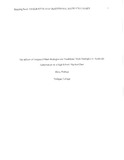| dc.contributor.advisor | Kariuki, Patrick | |
| dc.contributor.author | Phillips, Haley | |
| dc.date.accessioned | 2016-06-01T15:07:23Z | |
| dc.date.available | 2016-06-01T15:07:23Z | |
| dc.date.issued | 2016 | |
| dc.identifier.uri | http://hdl.handle.net/11558/1058 | |
| dc.description | Master of Education (M.Ed.) Thesis | |
| dc.description.abstract | The purpose of this study was to examine the effects of integrated math strategies and traditional math strategies on academic achievement in a high school algebra class. The sample consisted of five female and three male high school students who were enrolled in a home school program called Kingsport Area Christian Home Education Association (KACHEA). Data were collected using teacher-made tests. The students were administered a test after being taught using integrated math strategies, specifically Khan Academy. The data were analyzed using dependent t-tests. The results indicated a significant difference between students’ performance with fractions when taught by integrated methods and when taught using traditional methods (t(7)=-4.864. P<0.05). The results suggest that use of integrated math strategies is beneficial in teaching math. | en_US |
| dc.language.iso | en_US | en_US |
| dc.subject | Math instruction | en_US |
| dc.subject | Academic achievement | en_US |
| dc.subject | High school | en_US |
| dc.subject | Algebra | en_US |
| dc.subject | Home school program | en_US |
| dc.subject | Kingsport Area Christian Home Education Association (KACHEA) | en_US |
| dc.subject | Master of Education (M.Ed.) Thesis | |
| dc.title | The Effects of Integrated Math Strategies and Traditional Math Strategies on Academic Achievement in a High School Algebra Class | en_US |
| dc.type | Thesis | en_US |

